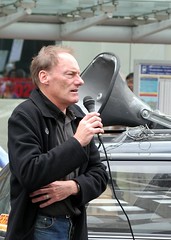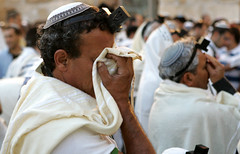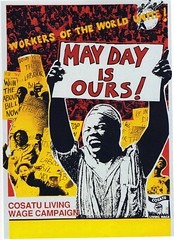A week ago John Minto, the man responsible for organising vociferous protests in New Zealand against the Springbok rugby tours in the 80's, told the South African government: If you ever thought of giving me an award, not to bother.

John Minto
Originally uploaded by farrioth.
We protested to fight apartheid and were proud of that and then Minto continued:
However while political rights have been won and celebrated, social and economic rights have been sidelined. It is now 14 years since the first African National Congress government was elected to power but for most the situation is no better, and frequently worse, than it was under white minority rule.
The number of South Africans living on less than $1 a day more than doubled to 2.4 million in the first 10 years of ANC government. Despite strong economic growth overall poverty levels have not improved and the gap between rich and poor has increased with many black families being driven more deeply into poverty. Unemployment remains high at around 26%.
At times I feel just a little sorry for Thabu Mbeki and the ANC. Why? Because of what John Minto said next:
"Apartheid was accurately described as a “crime against humanity” by the United Nations and the ANC. I could not in all conscience attend a ceremony to receive an award conferred by your office while a similar crime is in progress."
 "Long batons fly in Newtown as riot police block protestors in Rintoul Street from reaching Athletic Park for the second test, 29th August 1981".
"Long batons fly in Newtown as riot police block protestors in Rintoul Street from reaching Athletic Park for the second test, 29th August 1981".Apartheid was very very bad. But it has to be said, the Nationalists had some very stiff competition if one wanted to judge governance, exploitation and violence in this part of the world.
And quite frankly they never made it into the premier league of any of these categories. Want violence I'll name you tow dozens other countries that were worse. Governance? I'll name even more, exploitation? You kidding me? The governments of Uganda, Ethiopia, Rwanda, Sudan, the Congo, Algeria, Kenya, Nigeria, Zimbabwe, the Ivory Coast, Liberia, Angola to name but a few, were all at times much more bloody, corrupt and in greater neglect of the well being of their citizens, than apartheid South Africa.
In short apartheid does not deserve the moniker of a crime against humanity, in the context of what was going down routinely all across Africa, unless you want to concede the title to half the countries on the continent.
For various but very particular reasons (
left wing moral relativism, simplistic analysis, historical
Anglo antipathy towards Afrikaners) South Africa got the lion's share of the global left's opprobrium. Opprobrium that was completely out of proportion if one considers the suffering caused by an array of brutal regimes and the scant attention their actions received.
This 'exaggerated' attention morphed into uncritical support for the ANC. This helped the ANC enormously. It helped them set up office and organise. It helped them hide the Stalinist closed authoritarian nature of the organisation's external operations. It helped them cover their incompetence, and it helped them cover the torture and disappearance of their own members.
 A woman show signs of battle after protesters and red squad police clashed at the Luxford Street-Rintoul Street intersection during anti Springbok tour demonstrations in Wellington, 1981."
A woman show signs of battle after protesters and red squad police clashed at the Luxford Street-Rintoul Street intersection during anti Springbok tour demonstrations in Wellington, 1981."It helped obscure the fact that for many black ANC members the organisation was, not the creature of the Freedom charter, not liberal or progressive either. But a black Nationalist organisation at best, and for yet others it was just an instrument to attain power and resources.
But it helped the ANC secure negotiations and it helped them beat the Nationalists during negotiations.
But most importantly it also helped all South Africans, but particularly black ones get rid of the apartheid system. And less important, but also significant, it helped Afrikaners get rid of the Nationalists stifling and controlling morals and strictures.
After 1994 this global left's 'gaze' helped hold open debate in the country in a vice of silence, nobody dared criticize the ruling party. That was until the Aids deaths of thousands, creeping levels of inequality, blatant corruption and the intolerant battle for control of the ANC finally broke the spell.
But this progressive spot light has not gone away. As enamored as the Spanish speaking and American left of the world is with Venezuela, the English speaking world's lefties are fascinated by and have invested intellectually in South Africa. They are looking in a new way and they do not like what they see.
And as unfair as comparisons as the one above is in absolute terms (especially when compared to our neighbors) - they are still going to be made.
It's no help for
Mbeki to point out that particularly since 2002 his government has with robust growth and an array of social grants - grants that very few developing countries have - managed to address poverty levels.
We are still measured with a different yard stick. The sword that helped struck down apartheid turns out was double edged. It will be wielded against the ANC. Their every move will be monitored like no other African government's actions will. But for South Africans by and large, like with the battle against apartheid, this is still a good thing.
John Minto again:
Receiving an award would inevitably associate myself and the movement here with ANC government policies. At one time this may have been a source of pride but it would now be a source of personal embarrassment which I am not prepared to endure.
Hear hear says Mhambi.
Sphere: Related Content
 Pissing on Afrikaners - Reitz racists
Pissing on Afrikaners - Reitz racists


















